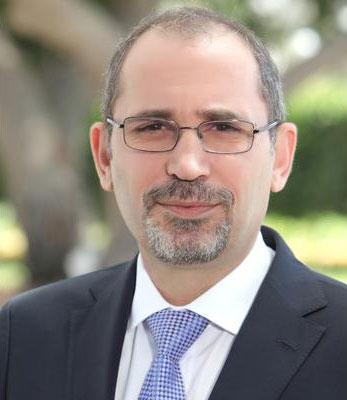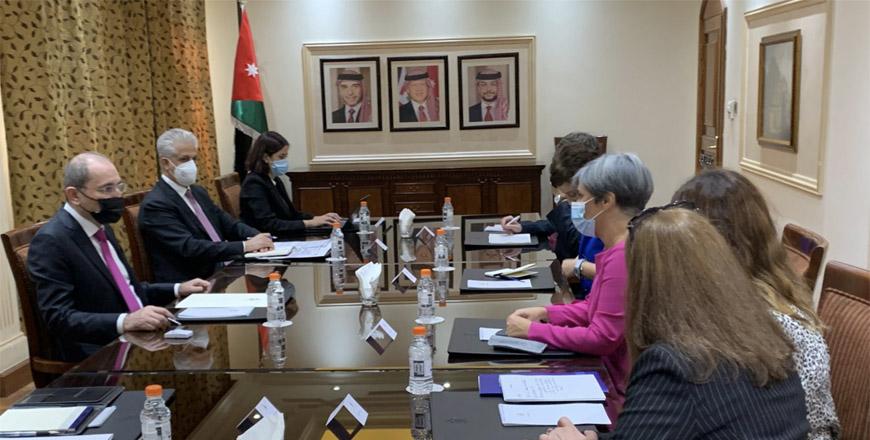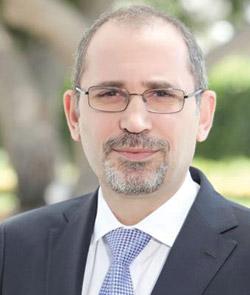You are here
Investment fund to support Kingdom to be launched at EU-Jordan Association Council meeting at Dead Sea — Safadi
By JT - Jun 02,2022 - Last updated at Jun 02,2022

Deputy Prime Minister and Foreign Minister Ayman Safadi
AMMAN — Deputy Prime Minister and Foreign Minister Ayman Safadi on Wednesday announced that the 14th meeting of the EU-Jordan Association Council will feature the launch of an economic investment fund to support Jordan.
In an interview on Al Mamlaka TV, he said that it was agreed to hold the meeting in Jordan, reflecting European keenness to support the Kingdom, as this is the first instance in which the EU and Jordan convene outside the borders of Brussels.
It also constitutes a first for any of the EU-affiliated Association Councils to not hold a meeting in a European capital, he noted.
Safadi described the relation with the EU as “solid”, adding that the Association Council’s agreement was signed 20 years ago, adding that 14 Association Council meetings have been held since then.
Due to the spread of the coronavirus pandemic, the council did not meet in 2021, he added, noting that it was agreed to hold a meeting in 2022 in Jordan as a sign of European keenness to support the Kingdom, appreciating its efforts, role, achievement, moderation and policies aimed at ensuring development and peace in the region.
The meeting will deal with a number of sectoral, development priorities related to launching the fund in order to bolster the economy and investments in Jordan, he said.
Minister of Planning and International Cooperation Nasser Shraideh as well as a number of ministers will attend the meeting, Safadi added.
The meeting, scheduled to be held on Thursday in the Dead Sea area, will be chaired by High Representative of the EU for Foreign Affairs and Security Policy Josep Borrell.
Most notably, participants will include Commissioner for the European Commission Neighbourhood and Enlargement Oliver Varhelyi as well as a number of foreign ministers, EU officials.
Four foreign ministers from European countries, namely Greece, Cyprus, Luxembourg, Ireland, and senior Jordanian officials will attend the meeting, he said.
Jordan will be the first Southern Neighbourhood country to agree on partnership priorities, Safadi highlighted, noting that the meeting includes exchanging documents ratified in service of these priorities.
Regional issues, ensuring security and stability, resolving regional crises, and the five-year cooperation plan within the framework of the Partnership Priorities Agreement that extends until 2027, will also be discussed.
The EU is a key partner for Jordan, and the Association Council meeting on Thursday is an indicator of working hand in hand to support the development process, he said.
The foreign minister underlined that there is great cooperation with the EU to support projects in vital sectors such as water, energy, education among others.
A segment will be allocated to focus on joint efforts to overcome regional challenges and achieve security and stability, especially with regard to Palestinian cause, the main central issue, and finding “political horizon” to break “stalemate stituation”.
Stressing the depth of EU-Jordan relations, he stressed that both parties are in the process of launching a major economic and political reform and modernisation programme.
His Majesty King Abdullah had rendered economic, administrative and political modernisation a priority, Safadi said, adding that Europe possesses expertise and capabilities in this area.
In regard to the US-Jordan relations, Safadi said that the two would be completing a memorandum of understanding that frames the assistance provided by the US to Jordan, as efforts are exerted under the direct guidance of the King.
His Majesty encouraged finding channels, building relations and establishing partnerships that help improve the Jordanian economy, thus improving the economic conditions of Jordan and its people, the minister said.
Relations between Jordan and the EU were established in 1977 through the signing of a cooperation agreement, which was replaced by the Association Agreement signed on November 24, 1997, and entered into force on May 1, 2002, after being ratified by all European parliaments and the Jordanian Parliament.
The agreement came in line with the government's keenness to strengthen economic and political cooperation with the EU member states, and foster economic openness, expanding markets and encouraging direct investment in Jordan.
Thursday’s meeting will discuss the most prominent prospects for cooperation and partnership and ways to enhance it, especially in light of the partnership priorities document between the two sides for the years 2021-2027, which will be adopted during the council’s meetings, according to the Foreign Ministry.
The government will present its economic work priorities programme for 2021-2023, which focuses on recovery and economic growth by stimulating the private sector to create more job opportunities for Jordanians, especially for youth and women, and supporting hard-hit sectors by the pandemic, in addition to improving coverage of national social protection programmes.
The Jordanian-European Partnership Agreement consists of several clauses dealing with all arrangements and regulations related to various topics.
Foremost of these topics are industrial and agricultural, removing non-tariff restrictions, rules of origin, right to establish companies and services, liberalisation of trade in services, payments and capital movement, government bids, and intellectual property rights.
Related Articles
AMMAN — The 14th meeting of the Jordan-EU Association Council is scheduled to be held on Thursday in the Dead Sea area, with a focus on bila
AMMAN — Deputy Prime Minister and Foreign Minister Ayman Safadi on Thursday met with Chair of the European Parliament Delegation for relatio
AMMAN — Foreign Minister Ayman Safadi will start a visit to Brussels today to co-chair the 12th meeting of the EU-Jordan Association C













